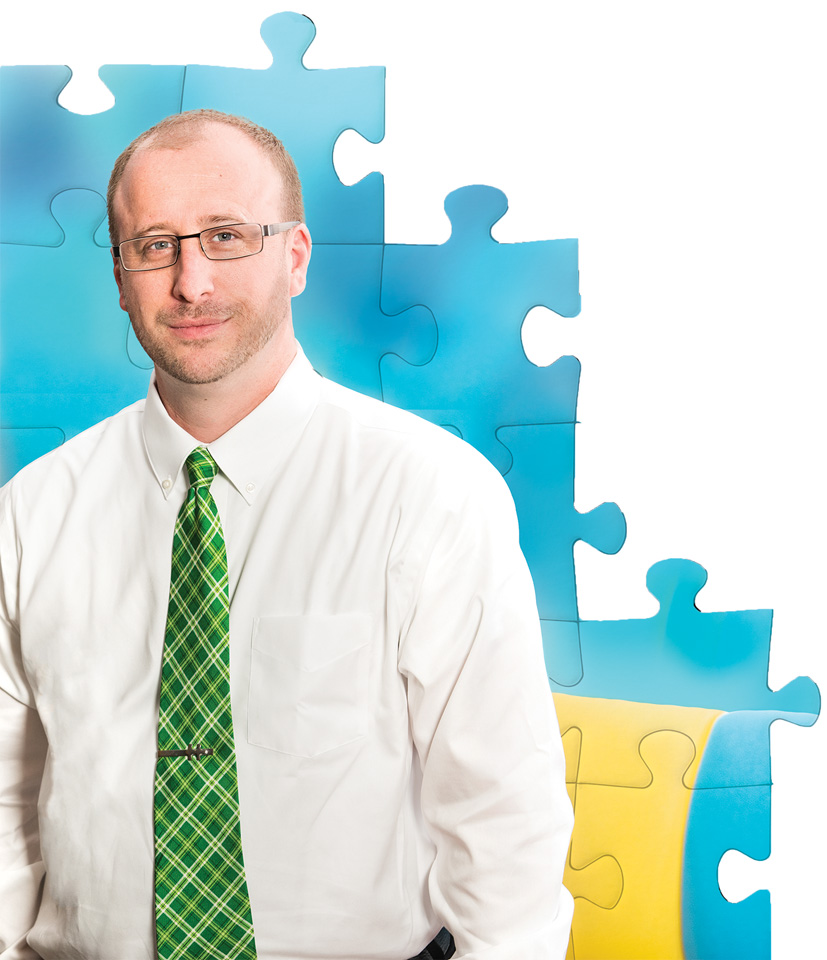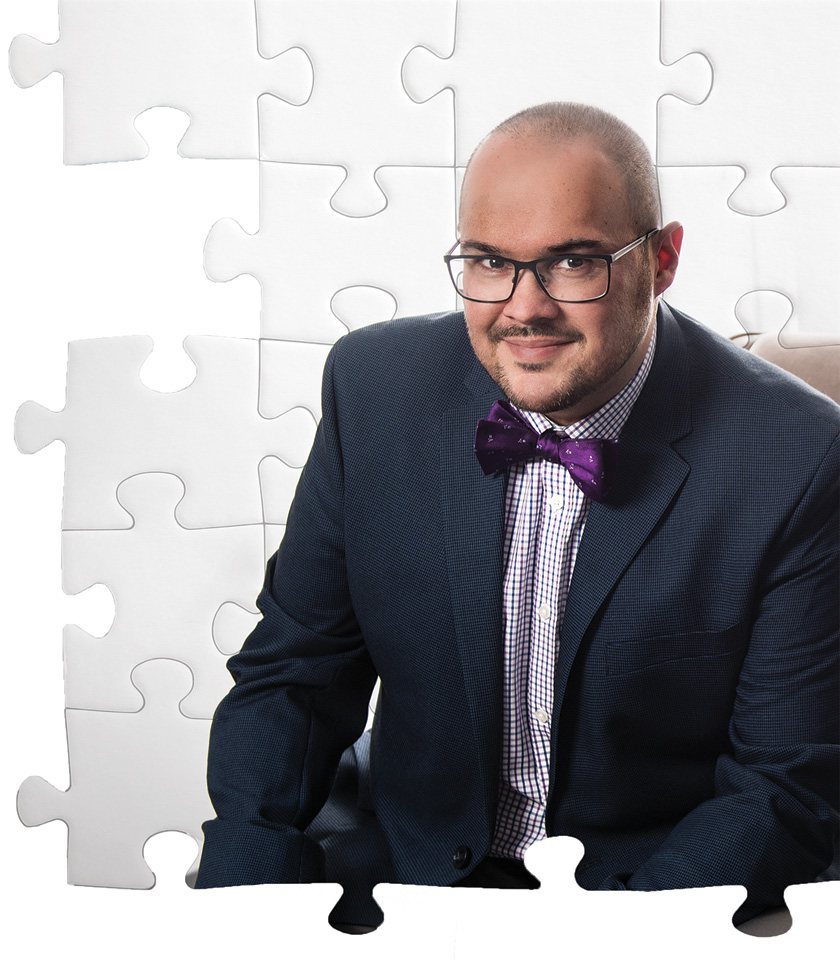Advancing Autism Awareness
From diagnotstic testing and intervention services to behavioral therapy and counseling,
alumni are providing effective treatment for people with autism and training and hope
for their families.
December 8, 2016
Lori Sekhon ('83, '85 M.S.) spends her days showing children the power of communication. Whether
she's encouraging a nonverbal 3-year-old to use sign language or helping a 6-year-old
with speech difficulties put words together in an intelligible way, she empowers them
to ask for what they need.

Lori Sekhon ('83, '85 M.S.) is a speech-language pathologist with her own practice,
Lori Sekhon Speech and Language Services, in Dallas, which serves individuals with
autism.
A speech-language pathologist, Sekhon works with clients who have autism and have challenges communicating. Using individually tailored activities and evidence-based therapy techniques, she helps them improve communication so they can develop relationships and participate in society.
"With every child, I work to help them expand their expressive language. One way to do that is to require that they ask for what they want, at the appropriate level," Sekhon says. "For some, that means speaking a full sentence, but for others it might be saying one word, signing or pointing to a picture."
Autism spectrum disorder, a developmental disability that causes social, communication and behavioral challenges, varies in severity and there is no known cause. As the prevalence of American children diagnosed with an autism spectrum disorder has increased drastically, from 1 in 150 in 2000 to 1 in 68 today, so has UNT's presence as a leader in autism-related education, training and research.
UNT's Department of Behavior Analysis in the College of Public Affairs and Community Service began studying autism in the 1970s, and the College of Education has offered special education graduate students an autism intervention focus for more than 20 years. Other programs in educational psychology and speech-language pathology also have focused on autism studies.
And in 2012 -- with the help of Kristin Farmer ('95 M.Ed.), founder and CEO of ACES (Comprehensive Educational Services Inc.) -- UNT founded the Kristin Farmer Autism Center. It serves as a multidisciplinary resource in the North Texas region for families caring for a child with autism.
"It's a true lab school," Farmer says. "Children and families are positively impacted by the services and students at UNT, and future teachers, therapists and practitioners from all disciplines are benefiting greatly from what they learn."
Developing language
Shortly after graduating from UNT and beginning work as a pediatric speech-language pathologist, Sekhon encountered patients with autism.
"I learned how to conduct speech and language therapy at UNT, and then through working with some very experienced behavior analysts, I learned how to apply it with kids with autism," Sekhon says. "For me, the blending of speech-language pathology and behavior principles is a winning combination."
Sekhon's private practice in Dallas, Lori Sekhon Speech and Language Services, has served individuals with autism since 1994.
"Our kids with autism are the hardest-working kids around, hands down. It takes so much cognitive energy to do what we ask them to do," Sekhon says. "Learning a new communication skill is difficult, but I find fun ways to motivate every child to achieve what we're working toward."
Sekhon and her husband, Punjab Sekhon ('90), are thrilled that their daughter, Anna, enrolled at UNT this fall and is pursuing a master's in speech-language pathology.
"It makes me really proud to know that UNT places an emphasis on autism research and education, and that my daughter is studying there," Sekhon says. "It's going to take different disciplines and approaches to continue making progress in the field."
Empowering educators

Michael Tucker '01, '05 M.Ed.) is an autism consultant for Education Service Center
Region 11 in Texas.
Michael Tucker ('01, '05 M.Ed.) didn't know much about autism when he came to UNT from Garland.
After working at a day care during his freshman year and meeting a child with Down syndrome, Tucker turned to UNT job boards as a sophomore in search of something that would align with his interest in special education. He secured a part-time job helping a young boy with autism in Plano with social skills, reading and other therapies.
"Within a week, I knew this was the path for my life," says Tucker, who initially was studying astronomy. He landed as an interdisciplinary studies student and minored in special education, meeting his wife, Kathryn McCoy ('01), in special education classes.
Although he had passion and drive as a first-year teacher after graduating, Tucker says that he still wanted to learn more about how to teach kids with autism.
It was after returning to UNT to work on his master's degree in special education that he learned about evidence-based practices proven by researchers as effective for working with students with autism, such as prompting and self-management. With this new knowledge, Tucker felt empowered to make the greatest impact.
"To see how much the kids grow and for every day to be different, it is so rewarding," he says.
He credits the master's program with increasing his self-confidence and validating that the work he does is meaningful.
"One of my favorite things was meeting with professors and colleagues who experienced similar situations in their schools, and learning from them," Tucker says. "In special education, you're often the only person on your campus, or sometimes in the district, who does what you do. To be in an environment that affirms what you're implementing is very helpful."
In Tucker's current role as an autism consultant for Education Service Center Region 11 in Texas, he equips teachers daily in implementing the more than 25 evidence-based practices that have been identified for aiding children with autism.
"If I went out and polled teachers who work with kids with autism, and asked them to name 10 of the evidence-based practices, most of them wouldn't know," Tucker says, as the practices have only been identified within the last 10 years. "Teachers know what to do in principle but still need more information on how to teach it."
Advocating for all

Malika Pritchett ('10 M.S.) is a behavior analyst and owner of Positive Enlightenment,
an Austin-based behavioral consulting service.
Behavior analyst Malika Pritchett ('10 M.S.) regularly hears from teachers about how more training is needed to work with children with autism. As owner of Positive Enlightenment, an Austin-based behavioral consulting service, Pritchett spends each day with her clients, their families and other members of their support systems, like teachers, doctors and other therapists.
"I'll go from visiting clients' homes for therapy and providing guidance to their families, to participating in school-based and support meetings, and collaborating with all other professionals that serve them," says Pritchett, who earned a master's in behavior analysis.
While awareness of autism is increasing among the general public, Pritchett acknowledges there's still a lack of understanding about the autism spectrum.
"People with autism mainly have difficulties communicating. They can learn and grow at extremely rapid paces as long as they have significant therapeutic intervention and collaborative support from everybody that serves them to learn and grow," Pritchett says. "Most don't have an intellectual disability."
Pritchett says instilling hope in families and providing parents with the tools they need to help their child is the most meaningful part of her job.
"When parents reach out for support, they are typically pretty lost and exhausted. Parenting children who are in a lot of respects delayed or not where you envisioned them to be can be sad," Pritchett says. "When I come in and get to be part of the family, for even brief amounts of time, and provide the support, it is fulfilling. To see the child progress and watch as the parents see therapy work and their child move in the right direction is incredible."
For Pritchett, it is monumental each time she teaches a child to communicate. She says she first experienced the supreme joy of witnessing a child's first words while working at the Easter Seals Autism Treatment Program in Carrollton, a partnership with UNT's Department of Behavioral Analysis, during graduate school.
"When you teach children with autism to communicate, their worlds are instantly improved," she says. "And their worlds become much happier places."
She credits the department for empowering her to become a high-caliber professional.
"They teach graduate students to be professional, dedicated, assertive and compassionate scientists," Pritchett says. "These core values were modeled by the faculty and infused throughout the classroom, research opportunities, practicums and clinics."
Need for services

Regina Crone ('06 M.Ed., '10 Ph.D.) is a behavior analyst and owner of Therapy and
Beyond, with locations in Denver, Tulsa, The Woodlands, Houston, Carrollton, Colleyville
and Fort Worth.
It was the hope instilled in Regina Crone's ('06 M.Ed., '10 Ph.D.) family by therapists that paved the Carrollton business owner's career trajectory.
"My youngest brother was adopted from Russia at 18 months old and was nonverbal. He had a difficult time communicating and would often bang his head in frustration," Crone says. "My parents, desperate for help, found a therapist who understood motivation and how to use sign language to teach communication. This facilitated expressive language and from there he went on to attend typical school and today is an active college student with a part-time job."
Observing how working with therapists improved her brother's skills led Crone to begin working with children with disabilities in high school as a behavioral technician. After earning her bachelor's degree in North Carolina, she selected UNT for her master's and doctoral degrees in special education.
"Once I learned that UNT's special education program was applied behavior analysis-friendly," Crone says, "I knew it was where I needed to be."
Applied behavior analysis uses proven techniques and principles, like positive reinforcement, to generate positive changes in behavior.
One of the first individuals Crone met when arriving in Denton was Kevin Callahan, executive director of UNT's Kristin Farmer Autism Center, who proctored her student teaching. She counts him among the most influential individuals in her life.
"Dr. Callahan is a brilliant and inspiring person who brings out the best in people," she says.
For three years, Crone taught special education in the Carrollton-Farmers Branch ISD by day and worked as a board-certified behavior analyst at night and on weekends. Then she launched her own therapeutic practice, Therapy and Beyond, to provide clients with applied behavior analysis services focusing on the entire family as part of the therapy plan. The practice has since grown to include seven clinics across three states.
"Knowing that I could only help so many families alone, I began to build a team of dedicated professionals focused on effective treatment, which now includes other UNT alumni," Crone says.
Therapy and Beyond celebrated its 10th anniversary this year and employs more than 180 individuals at locations in Denver, Tulsa, The Woodlands, southwest Houston, Carrollton, Colleyville and Fort Worth. Therapeutic services have grown to include speech therapy, counseling support, applied behavior analysis, and inclusion opportunities in private schools.
Crone earned her Ph.D. in special education from UNT and credits Smita Shukla Mehta, professor of educational psychology, for mentoring her into the professional she is.
"She challenged me to become the best student I could be," Crone says. "The rigor that she requires prepared me to always seek excellence."
One of Crone's greatest priorities in leading her team is making sure that families are supported and providers work together to create highly individualized plans.
"To make therapy most impactful and to ensure individual progress," Crone says, "we are family-focused and take the time to make learning meaningful and fun to maximize every teachable moment."
Coordinating care

Pablo Juárez ('00) is director at the Treatment and Research Institute for Autism
Spectrum Disorders at the Vanderbilt Kennedy Center in Nashville.
By coordinating care and determining a way to deliver services through existing avenues, Pablo Juárez ('00) has enabled Tennesseans with autism to receive the intervention and resources they need.
A trained board-certified behavior analyst, Juárez serves as director at the Treatment and Research Institute for Autism Spectrum Disorders at the Vanderbilt Kennedy Center in Nashville. The institute is dedicated to improving assessment and treatment services for individuals with autism, while advancing knowledge and training for their families, educators, other service providers and community partners.
"Everything we do here is focused on providing more access for people and developing high-quality services, which can be embedded in existing state programs," Juárez says. "Often, the only way people can get service is through the state."
As the principal investigator of institute-funded programs totaling $13.3 million, Juárez is helping to lead projects that include diagnostic and clinical evaluations, early childhood intervention, school-based consultation, school-age services and parent training.
He says his UNT degree in applied behavior analysis and student experiences have contributed to his success.
"I was given a number of opportunities to develop collaborative and leadership skills -- through the yearbook, Theta Chi, the Behavior Analysis Student Organization and North Texas Forty -- that matched the knowledge I gained there," Juárez says. "My time at UNT gave me a lot of confidence."
In Tennessee, Juárez and institute colleagues helped to address a shortage of autism services in the western third of the state by developing a telemedicine-based diagnostic service, such as the use of Skype with a doctor for an evaluation, and implementing early intervention services.
Providing services to those living in rural and low-income areas is a challenge the institute is undertaking, and it also is examining how technology, such as telemedicine, can be used to reach people.
"We need to provide access for people for testing and services and determine a way we can deliver what they need in an efficient and effective manner," Juárez says. "We want to make sure they're getting whatever they need to have the best possible quality of life."